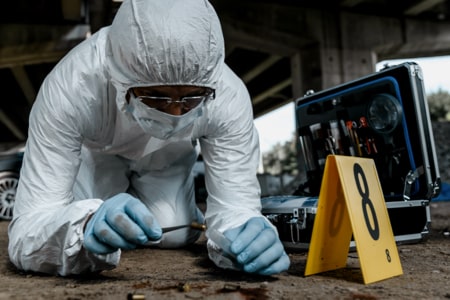Updated: December 22, 2021
Criminologist or Criminalist: Which Career Path Fits You?

In this article
Criminologists vs Criminalists: Who Does What?
If you want to get a criminal justice degree, you have to first know which criminal justice field you’re interested in. And there is some confusion between them. For instance, when you hear the terms “criminalist” and “criminologist,” you have to admit that they are just a little bit confusing.
But they are quite distinct jobs, and no one with a criminal justice degree would ever mix them up.
The Field of Criminalistics
Forensic criminology focuses on delving deep into the study of crime by examining its causes, criminal motivations, and addressing legal and investigative inquiries. It involves the application of scientific principles to the field of law. While criminal justice encompasses the broader scope of criminal activities and their control through policing and corrections, forensic criminology delves into the intricacies of crime to provide insights and solutions
Job Duties:
Criminalists work in crime laboratories and at crime scenes examining physical evidence to reconstruct a crime scene. Physical evidence can be a weapon, a piece of clothing, a bloodstain, or drugs. Fingerprints, bullets, and shoe impressions are some of the important clues that criminalists analyze.
Finally, criminalists may testify in courts of law, educating the judge and jury about the conclusions reached in the laboratory. Criminalists teach jurors about the techniques that were used in their analysis, the results obtained, and interpretations derived from their conclusions.
Education:
A criminalist is a person with a background in science, typically having at least a bachelor’s degree in an area such as chemistry, biology or forensic science. However, many criminalists also opt to earn a criminal justice degree instead, with specialization or internships to show potential employers their forensic intentions.
Below are some of the forensic specialties that you can pursue with a criminal justice degree:
- Firearms and Ballistics:
- Criminalists provide information to investigators about the caliber and type of firearms used in a crime. Scratches are left on bullets by the barrel of a gun so when a firearm is recovered, these marks can help identify the firearm and link it to a crime.
- Trace Evidence:
- Criminalists also analyze trace evidence in fibers, hair, soil, glass, pollen, explosives, food, and just about anything involved in a crime. No training will prepare criminalists for every kind of evidence they will encounter since each case is unique, but trace evidence is covered in all the best criminal justice degree programs.
- DNA and Serology:
- Since the 1980s, DNA techniques have begun to be applied to forensic cases. Any tissue from the body carrying DNA may be used to identify a person. Increasingly, innocent people have also been released from prison based on DNA evidence analyzed by criminologists.
- Drugs, Alcohol, and Toxicology:
- Criminalists use their knowledge of chemistry to identify controlled substances in drugs and body fluids.
Still, more people find that they want to pursue specific careers in forensic science, careers requiring very specialized education paths. Some of these subjects might be covered or introduced in a forensic science degree, but not to the point of expertise. In this case, criminalist hopefuls would do research before starting their education, or go back to school. Here are some fields where gaining expertise potentially means looking at a different degree path, like medical school, doctoral degrees, or even a bachelor’s with appropriate work experience.
- Biology
- Digital and multimedia sciences
- Engineering
- Entomology
- Odontology
- Pathology
- Physical anthropology
- Toxicology
Criminology in the Realm of Criminal Justice
Criminology is the scientific study of crime, criminals, and corrections. A criminologist studies normal social behaviors and deviations from the norm. Criminologists are often academics who study crime and the law. They often have a criminal justice degree that helps them provide theoretical explanations of delinquent and criminal behavior, and they specialize in criminal profiling, which helps investigators predict and profile the characteristics of unknown offenders.
A good criminal profiler needs to demonstrate creativity, analytical thinking, and problem-solving.
Job Duties:
Criminologists work with law enforcement agencies to develop profiles of particular types of crimes and gather statistics on crime rates. This helps law enforcement agents prevent crime before it happens, or may help them apprehend criminals once a crime has been committed.
Entry-level criminologists conduct data collection, catalogue information about the possible causes of crime, and compile crime statistics. More advanced criminologists also analyze and develop crime prevention strategies.
Where Criminologists Work:
- Universities and government agencies employ professional criminologists for advanced teaching, and research and policy assessment.
- Criminologists may work in universities teaching criminal justice, criminology, legal studies, law, or sociology.
- Federal and state justice agencies employ criminologists as research officers and policy advisers.
- Criminologists are found in many different settings: airport security, corrections systems, probation or parole officers, drug enforcement agencies, FBI, TSA, Department of Homeland Security, and other law enforcement agencies.
Degrees with a Focus on Criminology:
Criminologists generally need a criminal justice degree, preferably with a minor in psychology or sociology.
Coursework:
Undergraduate criminal justice degrees include coursework in government, sociology, psychology, juvenile delinquency, criminal law, constitutional law, and criminal theory.
Additional coursework includes forensics, abnormal psychology, corrections, and statistics. Advanced criminal justice degrees are necessary for those who choose to teach or conduct professional research, and often for professional advancement.
